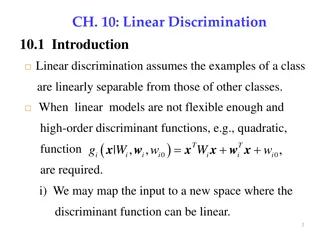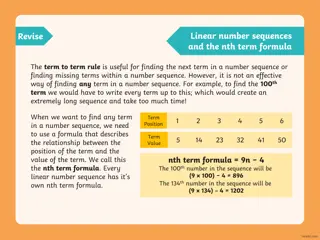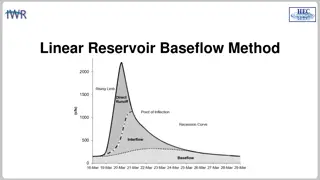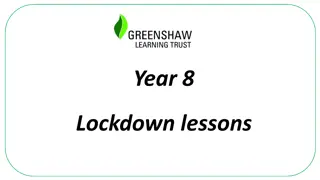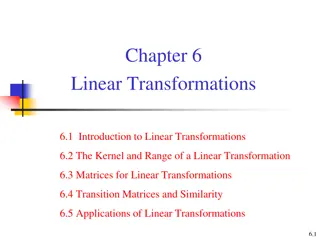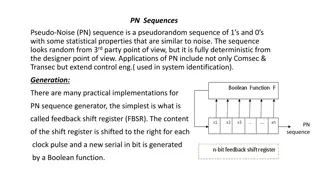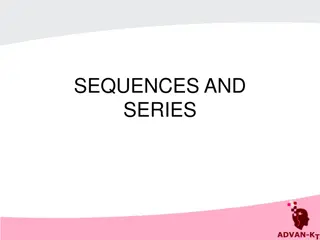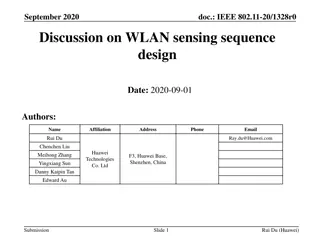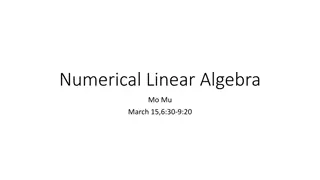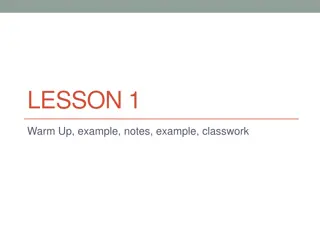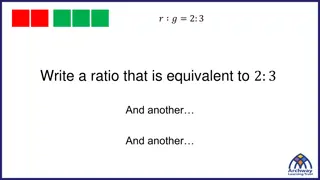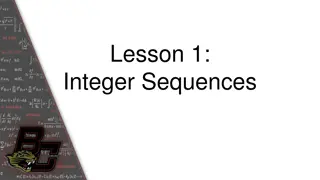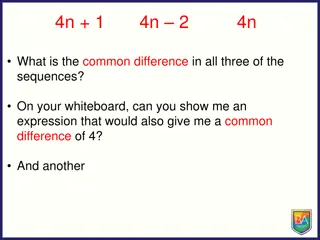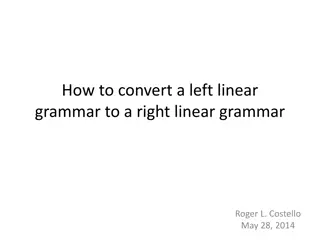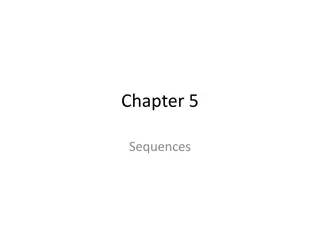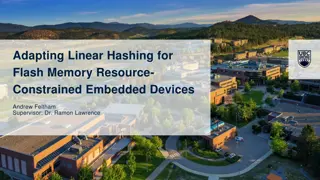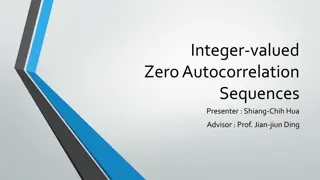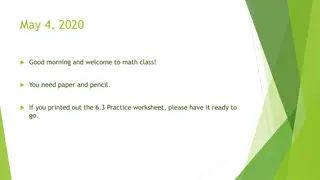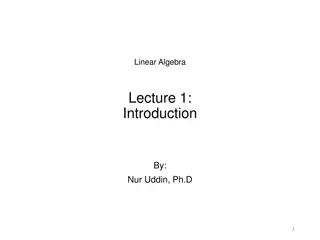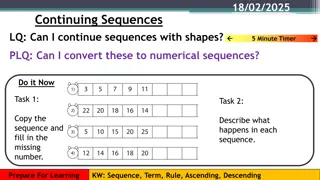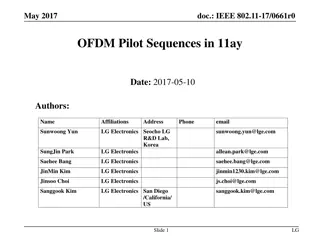Linear Discrimination for Classification
Linear discrimination is a method for classifying data where examples from one class are separable from others. It involves using linear models or high-order functions like quadratic to map inputs to class separable spaces. This approach can be further categorized as class-based or boundary-based, e
5 views • 37 slides
Linear Number Sequences and the Nth Term Formula
In mathematics, linear number sequences can be described using the nth term formula, which helps in predicting sequences and finding specific terms without generating the entire sequence. By understanding the relationship between term positions and values, one can efficiently determine any term with
6 views • 15 slides
Linear Reservoir Baseflow Method
The linear reservoir baseflow method utilizes linear reservoirs to simulate the movement of water infiltrated into the soil. This method models water movement from the land surface to the stream network by integrating a linear relationship between storage and discharge. Users can select from one, tw
3 views • 11 slides
Mastering Sequences in Mathematics
Delve into the world of mathematical sequences with this comprehensive guide. Explore what sequences are, different types like arithmetic and geometric, rules for continuing sequences, methods to find specific terms, and understanding position-to-term rules to solve for nth terms efficiently.
3 views • 17 slides
Linear Transformations and Matrices in Mathematics
Linear transformations play a crucial role in the study of vector spaces and matrices. They involve mapping vectors from one space to another while maintaining certain properties. This summary covers the introduction to linear transformations, the kernel and range of a transformation, matrices for l
4 views • 85 slides
Pseudo-Noise Sequences and Applications
Pseudo-Noise (PN) sequences are deterministic yet appear random, with applications in various fields such as communication security, control engineering, and system identification. Generated using shift registers, they exhibit statistical properties akin to noise. Linear and nonlinear feedback shift
3 views • 19 slides
Sequences and Series
Exploring the concepts of sequences and series in mathematics, including definitions, examples, and exercises on arithmetic sequences, geometric progressions, and general terms. Learn about generating sequences, finding nth terms, common differences, and common ratios in different types of sequences
1 views • 20 slides
Discussion on WLAN Sensing Sequence Design in IEEE 802.11-20/1328r0
This presentation by Rui Du from Huawei discusses the design of sequences for WLAN sensing in IEEE 802.11 standards. It covers topics such as existing sequences, analysis of sequences, ambiguity functions, Golay sequences, and properties adopted for communication sequence design.
4 views • 14 slides
Comprehensive Overview of Numerical Linear Algebra Methods for Solving Linear Systems
Explore numerical linear algebra techniques for solving linear systems of equations, including direct and iterative methods. Delve into topics like Gaussian elimination, LU factorization, band solvers, sparse solvers, iterative techniques, and more. Gain insights into basic iterative methods, error
9 views • 12 slides
Sequences and Patterns in Mathematics
Dive into the world of sequences and patterns with examples and exercises involving identifying patterns, writing formulas, and graphing terms on coordinate planes. Explore different scenarios and learn to express nth terms in sequences. Understand the importance of indexing terms and using proper f
1 views • 48 slides
Equivalent Ratios and Linear Sequences for Problem Solving
Learn how to identify and work with equivalent ratios, spot linear sequences, and solve problems using ratios. Practice simplifying ratios, correcting work, and applying ratios in real-life scenarios. Explore scenarios like sharing sweets between Alice and Bert to strengthen your understanding of ra
1 views • 19 slides
Linear Dependent and Independent Vectors
In linear algebra, when exploring systems of linear equations and vector sets, it is crucial to distinguish between linear dependent and independent vectors. Linear dependence occurs when one vector can be expressed as a combination of others, leading to various solutions or lack thereof in the give
5 views • 20 slides
Integer Sequences and Terms
Explore the concepts of integer sequences, including infinite and finite sequences, terms of a sequence, and nth term formulas. Learn to classify sequences as finite or infinite and find specific terms in a sequence. Gain a comprehensive understanding of notation and terminology used for describing
6 views • 23 slides
Sequences and Patterns in Mathematics
Dive into the world of sequences and patterns by exploring expressions, common differences, and nth terms. Discover how to create sequences with specific common differences, identify terms within sequences, and use Venn diagrams to visualize different scenarios. Uncover the rules for constructing nt
4 views • 13 slides
Converting Left Linear Grammar to Right Linear Grammar
Learn about linear grammars, left linear grammars, and right linear grammars. Discover why left linear grammars are considered complex and how right linear grammars offer a simpler solution. Explore the process of converting a left linear grammar to a right linear grammar using a specific algorithm.
5 views • 44 slides
Sequences in Database Management Systems
Sequences in a database are objects that generate unique numeric values automatically. They can be used to create primary key values and improve query performance. By defining sequences using the CREATE SEQUENCE statement in SQL, you can control the generation of sequential numbers with options like
5 views • 41 slides
Adapting Linear Hashing for Flash Memory Constrained Embedded Devices
This research explores the adaptation of linear hashing for improved data handling on flash memory-constrained embedded devices. Motivated by the increasing data collection by IoT devices, the study focuses on implementing database structures like a linear hash table for efficient data processing. T
2 views • 67 slides
Integer-Valued Zero Autocorrelation Sequences
Delve into the realm of integer-valued zero autocorrelation sequences, exploring concepts like periodic sequences, frequency domains, constant amplitudes, and more. Unravel the methods and techniques involved in creating these sequences and their significance in various applications.
2 views • 32 slides
Linear and Nonlinear Functions in Mathematics
Explore the concepts of linear and nonlinear functions in mathematics through identifying linear and nonlinear functions from graphs, understanding the characteristics of linear functions, and identifying linear functions from tables. Learn about the constant rate of change, slope, and how to determ
2 views • 49 slides
Introduction to Linear Algebra: Syllabus, Examples, and Solutions
Delve into the fundamentals of linear algebra through a series of lectures and examples by Nur Uddin, Ph.D. Explore the application of linear algebra in daily life scenarios, solving linear equations and systems, matrices multiplication, and more. Understand the concept of linear systems, solutions,
4 views • 24 slides
Continuing Sequences with Shapes
In this learning session on 18/02/2025, participants explore sequences with shapes, converting them into numerical sequences, and predicting future patterns. The content includes tasks involving drawing sequences, identifying rules, and predicting shapes based on rules like "Add 2" or "Add 3." Anima
0 views • 12 slides
Finding Nth Term Rule for Sequences
In this learning session on 20/02/2025, students explore how to find and express the nth term rule for sequences. They engage in identifying patterns, determining expressions, and predicting terms in various sequences, fostering a deeper understanding of mathematical rules and patterns. Through inte
0 views • 13 slides
Investigating Recursive Sequences
Today's exploration focuses on understanding and working with recursive sequences in mathematics. Learn about explicit and recursive equations, analyze sequences, and solve problems to enhance your skills in sequences and series.
0 views • 6 slides
Mathematical Treasure Hunt: Sequences Challenge
Engage students in a fun and interactive mathematical treasure hunt focusing on sequences. Cut out question slides, place them around the room, and distribute answer sheets for students to solve the sequence puzzles. Includes tasks on linear and Fibonacci sequences, geometric progression, prime numb
0 views • 11 slides
Digital Signal Processing and Sequences
Explore the fundamentals of digital signal processing, discrete-time signals, common signal sequences, conversions from analog to digital signals, periodic sequences, and operations on sequences. Learn about scaling, time shifting, reflection, and more in this informative guide.
4 views • 4 slides
Proposed OFDM Pilot Sequences in IEEE 802.11-17/0661r0 Document
This document from May 2017 suggests frequency domain pilot sequences for EDMG OFDM PHY in IEEE 802.11-17/0661r0. It discusses considerations for pilot sequences in different channel bonding scenarios and emphasizes the importance of mutual orthogonal pilot sequences for robust performance. The pres
3 views • 15 slides
Discrete Structures: Sequences and Sums Analysis
Explore the fundamentals of sequences, including examples such as Fibonacci sequence and evaluation techniques. Learn about arithmetic series, summation, and solve series problems. Discover the formula for sequences and useful sequences to enhance your understanding.
1 views • 33 slides
Analyzing Growth Patterns in Sequences for Better Understanding
Explore the comparison of linear and exponential growth patterns, graph representations, growth rates in sequences, and the impact of different growth rates on savings accounts. Delve into the potential of exponential growth and how it compares to linear and quadratic sequences.
2 views • 4 slides
Sequences and Series in Algebra 2
Explore the concept of sequences and series in Algebra 2 with examples, rules, and Sigma notation. Learn how to define, write rules, graph, and find the sum of sequences and series using Sigma notation and summation. Discover the patterns, rules, and methods to work with sequences and series effecti
5 views • 35 slides
Number Sequences: Patterns & Examples
Delve into the concept of number sequences, exploring the patterns and examples behind their orderly arrangement. Uncover the logic behind sequences like 10, 20, ?, 30 and 3, 6, 9, 12, 15, revealing the methodical progression of numbers in a sequence. Decode the mystery behind sequences such as 25,
0 views • 4 slides
Exploring Limiting Values in Sequences
Dive into the world of sequences and explore the concept of limiting values, discovering patterns and reflecting on challenging sequences. Engage with intriguing numerical patterns and sharpen your mathematical skills as you unravel the mysteries hidden within sequences.
0 views • 4 slides
Utilizing Golay Sequences for Radar and Sensing Applications
Explore how Golay sequences can be effectively used for radar and sensing applications, particularly in the context of IEEE 802.11 standards. Learn about the ambiguity functions associated with Golay sequences and their applications in channel estimation and detection sequences. Discover the benefit
0 views • 11 slides
Exploring Linear Sequences: First Terms and Next Steps
Dive into the world of linear sequences with this interactive guide. Discover examples of ascending and descending sequences, find the next terms in various sequences, and explore the patterns hidden within numbers. Test your knowledge with exercises to identify first terms and constant differences
1 views • 15 slides
IEEE 802.11-20/0782r0 EHT-STF Sequences for 240/160+80/320/160+160 MHz
Explore the proposal of 1x/2x EHT-STF sequences designed based on 80MHz/160MHz HE-STF sequences with additional phase rotation for improved PAPR. Comparison of PAPRs with data part for feasibility verification. Optimization of coefficients and utilization of 80HES for beneficial implementation and P
1 views • 27 slides
Converting Left Linear Grammar to Right Linear Grammar
Learn how to convert a left linear grammar to a right linear grammar. Understand the concepts of linear grammars, left linear grammars, and right linear grammars. Discover why left linear grammars are considered complex and why right linear grammars are more favorable. Explore the algorithm used for
3 views • 44 slides
Understanding Sequences and Summations in Computer Science
Explore the concepts of sequences and summations in computer science, including specifying sequences, closed forms of summations, special sequences like geometric and arithmetic progressions, identifying sequence formulas, and solving sequence problems. Dive into the world of ordered lists of elemen
2 views • 19 slides
Mastering Recursive Rules for Sequences in Mathematics
Discover how to define sequences recursively, write recursive rules for given sequences, and translate from recursive rules to explicit rules in this comprehensive guide. Dive into the world of sequences and enhance your mathematical skills.
2 views • 18 slides
Real Analysis Part II: Sequences and Bounds
Explore the concepts of real sequences, range of sequences, constant sequences, bounds, supremum, and infimum in the study of real analysis. This course is designed for students pursuing a Bachelor's degree in Mathematics at the University of Rajasthan, Jaipur. Dive into the fundamentals of sequence
1 views • 18 slides
Optimal EHT-STF Sequences for IEEE 802.11-20/0782r2 Document
Explore the proposed 1x/2x EHT-STF sequences for 240/160+80 MHz in the IEEE 802.11-20/0782r2 document. These sequences are designed based on HE-STF sequences with additional phase rotation to enhance PAPR. The coefficients are optimized for improved feasibility, and comparisons with data parts are c
0 views • 29 slides
Golay Sequences for Radar and Sensing Applications
Explore how Golay sequences can be utilized for radar and sensing applications, discussing their ambiguity function and practical implementations. Learn about the advantages of using Golay sequences and their role in radar systems. Discover how Golay sequences fit into IEEE 802.11-20 standards, part
0 views • 10 slides
